- Home
- Cynthia Ozick
Foreign Bodies Page 6
Foreign Bodies Read online
Page 6
“Nachtigall,” Bea said. “Julian Nachtigall.”
“I’ve got nobody like that on my roster, and believe me” — she tapped her forehead — “I’ve got them all up here.”
“A young man. In his twenties. An American.”
“There’s an American doctor on the top floor, he speaks French pretty well. But almost never here, you don’t mean Dr. Montalbano?”
“No, no, Nachtigall.”
“All these foreign names, you’d think we were with the Jews.” The concierge pleated the sides of her mouth into a smirk. “I know the one you want. He’s a Jew, the one you want, but I don’t like to spread it around. A squatter boy, with another squatter, and now there’s a third one, don’t ask me why. It’s a wonder he keeps them up there, he’s an odd bird, Dr. Montalbano, who knows what they’re up to —”
Garrulousness without plausibility. But what was plausible? Was it plausible that Julian had ascended from that other place to this place, the pauper to the palace? The woman was ready to jabber on, widening brownish lips in a know-it-all smile, while Bea escaped across the carpeted foyer toward the glint of a tiny elevator cage. It staggered shrilly upward, one, two, three, four, five, and at the sixth landing halted before a single door.
An ordinary button-bell.
It was cool here, and quiet. She stood and listened. Noiselessness behind the door, a ferocity of expectation — herself caught in a fixity, a movie-still excised from a scene of crisis, the frozen moment of her finger lifted, approaching the button, the button that was about to violate the silence behind the door (Iris’s lifted finger seconds before it fell blindly on a violated key) . . . A muffled ring; then nothing; then still more nothing; and finally the sound of a staccato bark — but a bark with a human timbre. The heavy scrape of shoes, scrabbling with a kind of hobble, as if the laces were untied, and from a diminishing distance a growling American voice: “Fine, not again, just when I’m dropping off you people have to go and forget to take the goddamn key —”
A young man, flabby at the neck, a thin horizontal blond mustache, streaming eyes, a handkerchief over his mouth. Volcanic coughing followed by a river of French.
“English, please,” Bea said.
“Oh, sorry, this stupid cold, so I thought it was . . . and when I saw it wasn’t . . .” A smothered row of gasps. “He’s away now, he’s in Milan for the month —”
Bea said, “No, no,” and then, as if catapulted: “I was here in July, I tried to look you up. Julian? Julian Nachtigall? I have your sister’s letter —” She stopped and took him in; he was really no more than a boy. Even the mustache was undeveloped.
He stared back with — it struck her instantly — her own father’s eyes: Tatar lids drawn low at the corners.
“My sister.” Two spiteful grunts. He gave her his back — a rip at the collar — and shambled off into a large central room, out of which other rooms opened: impossible to tell how many. A palace, and too much furniture, a scattering of sofas and armchairs. Assorted articles of female clothing draped here and there, a stocking dangling from a lampshade, another thrown over a picture frame. A blanket on the floor. She shut the door after her — he didn’t care, open or closed, stay or go, he was indifferent. She saw his shoelaces, straggling, undone. A wilderness, it was all provisional. It was incoherent. He picked up the blanket and tugged it around his shoulders and foundered into the cushions of a divan.
“You’ve got to be Iris’s aunt,” he said.
“Yours too.”
His recognition — of who she was, of what she appeared to threaten — was almost too rapid to assimilate; he had unhesitatingly understood what he took to be the whole meaning of it. An instinctiveness arrogantly sure of itself. It hinted at intuitive stirrings. It hinted at an inner life. But oh, the outer one!
He said, “She told me she spent the night at your place. She came so you wouldn’t. She told you to stay away.” A rattling volley shook him; he wiped his eyes with an angry swipe. “My father sent you, didn’t he? He made you come.”
“I came because I wanted to.”
“But he wanted you to, you can’t deny it. Even if you think some-thing’s your own idea, he’s behind it. That’s how it goes with him, and don’t say it doesn’t. He always gets his way.”
“Not with you. He’s asked you to come back, and you won’t.”
“My mother thinks I’ve been abducted, I suppose you’ve heard. Little green Martians maybe.” He let out a resentful groan and flung the blanket over his head. “My God, you walk in here, what are you, the company representative, the family spokesman? When in my life did I ever know you? Whatever you think I’m up to is none of your business. It’s not my father’s either.” He reared up, shivering, from under the blanket. “Damn it, why aren’t they back?”
She saw the dry swollen lips, the too pink nostril-wings, the fevered wretchedness of a sick and self-indulgent child. Sullen and stubborn. But she had surprised him, she was an eruption, an apparition — unfair and brutish. Standing there, tentative and stung, facing her nephew — Julian, the hard case — she had never so much as looked around, among all these little low tables and worn rugs and a bureau or two and a plethora of chairs, for a place to sit. The big room resembled a meeting hall, overused, abused, public, frayed. She had fallen into it no more than three minutes ago, and already a truculence was brewing. Had she crossed an ocean to be so quickly despised?
Deliberately, she made a space for herself at the far end of the divan, at his feet.
“Your father doesn’t know I’m here. I never told him I was coming.”
“Then what do you want?”
The question, even if soaked in phlegm, was pellucid. What did she want? It wasn’t that she had taken pity on Marvin, inconceivable as this was — when had Marvin ever needed her pity? The boy was right: in the end, for one reason or another, inescapably, she was doing Marvin’s bidding. Admittedly there was sanity in his bidding. The boy had somehow to be extricated. He reeked of chaos — it was an enveloping fume all around him. Chaos in his anger, chaos in this slovenly precarious abandoned flat. How did he keep himself alive? He was homeless, jobless, futureless. He was careless — he hadn’t bothered to tie his shoelaces. And worse: he hadn’t bothered to put on his socks: she discovered she was sitting on a dirty pair, with holes at the heels.
— The elevator’s squeal, a commotion in the corridor, a treble female voice. Scratchings in the keyhole — the key hadn’t been forgotten. A girl flew in — it was Iris — followed more soberly by the other one, Iris calling out, “Hey, sicko, we’ve brought you a cure-all, and a nice old-timey hot-water bottle for sick little old granny . . . Catch!”
A red rubber shape landed in Bea’s lap. A faceless homunculus with a thick neck. And here was Iris’s hand in midair, with her mouth startled into the beginning of a cry; but the cry came under instant guard, and slowly, coolly, Iris’s pale look traveled from her aunt cradling the rubber thing to her brother scowling, his fleshy chin on fire, to her own gauzy stocking hanging from a framed print of a waterfall.
“Aunt Bea —” and let the syllables burn out.
The other one drew a cylindrical vial from its paper wrapper and set it down; then stood mutely.
“It makes no sense,” Iris said. “It’s gone beyond. It’s pointless that you’re here. There’s nothing you can do, and it doesn’t matter now.”
But Julian, freeing himself from his swaddlings, got up and wound his arms around the other one. She was small and dark and thin and unbewildered. Scrawny, Bea saw, rather than slender, spiky at the shoulders. She was not young — or anyhow not young as Iris was young; she was a woman completed. Her collarbone protruded. With her cautious gaze fixed on Bea — Bea the intruder — she eased herself, familiarly but consciously, back into Julian’s chest, drawing his hands down across the front of her shirt. It was a man’s shirt, with long sleeves; her warm breasts were hidden there. She did not care how she dressed, or how she looked. Long slee
ves in mild weather.
“Lili,” Julian said, in a voice so growly and proprietary that Bea knew — it was as elusive and penetrating as an odor — that sex lurked behind it. Lubricious impulses. Surely his fingertips must be pressing into those twin nipples under the shirt. Bea imagined it, she imagined her own breasts under a man’s urgent palms, pressing, kneading, the hard knuckles hurting the feeling flesh, the tender glands, she imagined her body as a floating vitrine, you could see into it, she imagined it as a movie, the movie music swirling upward, the camera trundling in for the close-ups, you could watch the heavings of the ovaries and the uterus contracting, and the shining slime of liver and spleen . . . spleen, one of the medieval humors, and what were the other three? This was her brother’s son — her nephew. Inner life? The boy was no better than a savage. He was surprisingly plump, even his eyelids, swollen pink and fat as petals. A random drop hung from the tip of his broad nose. The stretched nostrils dripped mucus. And rasping, coughing between the words, he was intending to mock her. “Lili,” he said, “since this is turning out to be a family reunion, you might as well meet my father’s sister, come to save us all.”
Spleen, he was full of spleen!
12
IT DEVELOPED, when Iris found him, that he and Lili were living in a clinic. A kind of clinic, with a capacious waiting room intimating certain therapeutic overtones — not that there was any of the expected equipment, or even an examining table, anywhere in sight. During the months Dr. Montalbano was away — he had other clinics in other cities to attend to — Julian, in exchange for the use of the apartment, was to inform anyone who inquired that the clinic was suspended until the doctor’s return. The inquirers were likely to be new clients, since the old ones were familiar with the rhythms of his departures; nor would it be necessary for Julian to monitor the telephone. Dr. Montalbano’s telephone was shut off in his absence, and anyhow all his clients, the old and the new, were treated in the most confidential and personal way, and were required to come to his door. A good number were responding to ads — Dr. Montalbano’s ads were many and various, some posted conventionally in newspapers, some merely hand-printed and tacked up in local pharmacies. But many more (swarms, Julian said) were there through word of mouth.
Iris’s suitcase lay propped against the leg of a chair. The noise of four-engine propellers still lingered in her ears. Julian was past the first surprise, half an hour ago — his sister out of place, his sister who ought to have been where his mind had planted her, at home in California, far away; but here she was, her arms around his neck, kissing him all over his captured head, grinning at him. Julian shocked, confused, glad, unhappy. Suspicious.
“It won’t be just you, will it?”
“It is just me,” Iris said.
“You mean so far. Dad’ll be right behind you, hiding out at the Ritz or somewhere — he wouldn’t’ve let you come alone.”
“He didn’t. He thinks I’m in New York with Aunt Bea. It was supposed to be Aunt Bea. A fussy old thing, what could you possibly do with her? So I came instead.”
Julian said, “And what can I possibly do with you?”
“You can just let me look at you. At home we’ve been worrying that you’ve been starving in some attic, and well, you’re absolutely fat!”
“If you wait on tables you get to see these outlanders grazing in one café after another all day —”
Outlanders. And wasn’t he one himself?
“— and then,” Julian said, “they leave half their dinners untouched. I guess I’ve licked too many platters clean.”
“Oh my poor Julian, you’ve been going without regular meals
—” “Oh my poor Iris, you’ve just pronounced me too fat.”
An offhand teasing parry, an echo of their childhood: it emboldened her. There were all those letters — he hadn’t relinquished their old connection — yet she had sensed something veiled in them: a muffling of her brother’s voice. Did he, after an immersion of three years, think himself grown into Europe?
“I’ve brought you some money anyway,” she said, and instantly regretted it. She saw the beginning stir of a clutch of anger — it was in his neck. It bulged a little.
“A bribe from dad —”
“Nothing to do with dad. It’s that I don’t like to think of you needing things.”
The bulge collapsed into a shrug. “I’ve got everything I need. Only gaze upon my vast holdings —”
“And what happens after this Dr. Montalbano gets back?”
“We’re thrown out, I suppose, Lili and me. But in the meantime we’ve got the run of the place, and it doesn’t cost us a penny.”
“And afterward?”
“Afterward takes care of itself.”
Iris said, “You talk as if you’ve suddenly got religion, everything’s in God’s hands. Wouldn’t that surprise dad!”
“What’s it to me what he thinks, I’m done with him. And I haven’t got religion. I’ve got Lili.”
He had led her to a pair of double doors and pulled them open. A narrow balcony with an iron railing, and a stretch of Paris below. She looked down on a scattering of pedestrians, the strolling ones, the intent ones; a bare-shouldered woman tugging at a whining child. The whine a universal language. Everything else oddly wrong: the width of the pavement, the snout-nosed cars (at home they had winglike fins, like big metal sharks), the very bricks of the building opposite, and the languid tallness of its windows. Even the light seemed out of kilter, as if the sun had started out that morning mistakenly angled, a ship in the hands of an erratic navigator. This light was different from California light: it fell out of a sky so much smaller, so much older: an old old sky, drooling wrinkled clouds.
Out there on the balcony — two scarred wooden chairs — he began to speak of Lili. In spite of everything (but what, Iris wondered, was “everything”?) she was the strongest person he’d ever known, not in that bullying, self-deluding way they’d suffered under all their lives — she was a small sturdy stem: you could bend it and it would arch and never break . . .
This was the familiar Julian, sidling into vapor. Iris felt she could put her finger all the way into such talk and never get hold of a single fact. His thinking wouldn’t come clean, it ran around corners, it was all melting words, you couldn’t pin it down — it was like those dirty street pigeons he’d made into glossy doves. Who was this Lili, where did she come from, what did he intend to make of her? Or she of him? He had always been excited about one thing or another. He was inconstant, subject to phases. He went from snarls to fustian. He didn’t have his hands on the lever of life — this was how her father put it, but her father . . . well, he was what he was, a man who couldn’t feel. Or see. He couldn’t see Julian, the other meaning of him. What looked like volatility was absorption in the moment. Her brother, she knew, was born to feel. Listen to him now! He believed that a weed had a will. And this Lili, despite her name, was she a weed, one of those wandering European weeds? Those funny insertions in Julian’s letters, in that strange curly handwriting, what language was that?
“Romanian,” Julian said.
Distant, discordant, unreal. Waste and war, the weary guttural of one of those unimaginable hells. A place that wasn’t in any of the history books — not in California, anyhow.
“What was the point of doing that, it might just as well have been Chinese —”
“I made her,” Julian said. “It was telling without telling. Because nobody at home could read it.”
“You could’ve written anything you wanted, they didn’t have a clue when a letter came. I had a system, I told you.”
“But if dad just happened to get a look —”
“He never did. And you know he wouldn’t let mom see anything upsetting.”
“It’s not upsetting, it’s miraculous. But it couldn’t be told then, it wasn’t decided — Lili wasn’t decided. So I made her write it down that way, a sort of private code for herself, to convince her.”
&nb
sp; “Convince her of what?”
Julian laughed, almost a giggle, childishly.
“She was supposed to write ‘We are going to be married’ —”
“Julian! You didn’t really, you aren’t —”
“But what she actually wrote was ‘He is a foolish American boy.’ After the letter went off she admitted to it. She’s like that. She says what she thinks.”
“In a language nobody knows, so how can anyone tell what she thinks? Julian, you didn’t do such a thing, you didn’t go and get yourself married! To someone no one’s ever heard of —”
“Two months ago, beginning of June.”
“You are a foolish American boy.”
His little blond mustache quivered: each sparse thread had its own wet glint. Were they tears, those droplets all at once stippling the hairs on his lip? Foolish, foolish, yes! What had he done, what had he let himself in for? A feckless boy with a wife. That straggly mustache a callow banner.
“Right you are. Foolish and happy.”
But he was pulling a handkerchief out of the pocket of his shirt, and it was only that his nose was running, the start of a cold, he said, Lili had it first, he was bound to catch it, the people where she worked, refugees, DPs and such, half of them sickly, she was always bringing back the sniffles, or worse. They were mostly in trouble, those people, pleading and babbling in their worried old tongues, no use to them now, and dependent on a score of translators (Lili was one of them), and droves and armadas of letters, all with the same cracked cry: show me a way out, find me my niece, my lost second cousin, out, out! Lili took in these entreaties and hungers, she typed them soberly on white paper headed with an official logo. The life-throb was intense in her, he said, she had taught him everything. He had come to Paris like all those others, he’d gotten to know that crowd, he was at the far edge, he was nobody, but it was easy to get wind of where they partied, they’d begin at the Tabou at nine or ten at night and go on into the dawn, he’d tag along to the Monaco and the Napoléon, and always there was Alfred, this fellow from Brooklyn, bleached-out eyes nearly yellow, no lashes, bald as an apple, the squat middle of him round as Humpty Dumpty, short fluttery taffylike fingers, a yellow wig (no exaggeration!) wobbling on his shiny pate, Alfred knew them all, George Plimpton and Jimmy Baldwin and the rest of them, and once he’d actually made a pass at Julian, and offered to get some of his stuff into one of those magazines springing up all over Paris, poems and things — this was how he got into Merlin and Botteghe Oscure, and you remember how dad had fits — but when you came right down to it he wasn’t the real thing, and most of the others weren’t either, making it up for the sake of the parties, the whiskey, the local girls, the fake Beauvoirs, the girls from New York, the glamour, the fantasies of fame, it was all pretty exciting then, the kind of life he couldn’t have imagined back home, the pointless hole he’d been cornered into, or pushed through, dad’s clumsy ambitions for him, a ladder leading nowhere, the rungs at the top missing . . .

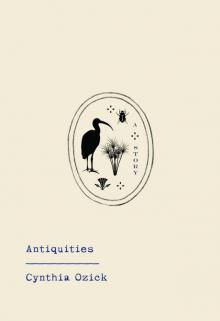 Antiquities
Antiquities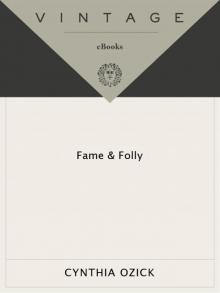 Fame & Folly
Fame & Folly The Messiah of Stockholm
The Messiah of Stockholm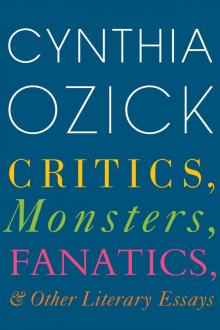 Critics, Monsters, Fanatics, and Other Literary Essays
Critics, Monsters, Fanatics, and Other Literary Essays Heir to the Glimmering World
Heir to the Glimmering World The Din in the Head
The Din in the Head Dictation
Dictation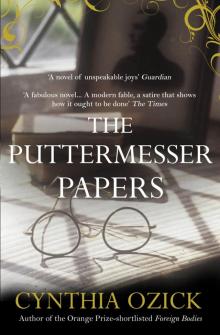 The Puttermesser Papers
The Puttermesser Papers Metaphor and Memory
Metaphor and Memory Art and Ardor
Art and Ardor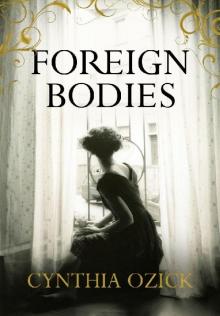 Foreign Bodies
Foreign Bodies Quarrel & Quandary
Quarrel & Quandary